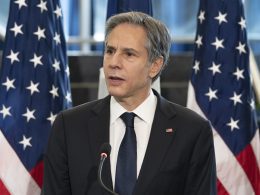In a stunning development, Treasury Secretary Janet Yellen issued a stark warning today about the impending threat of a sharp rise in borrowing costs for the United States. Yellen’s cautionary remarks came amidst a tense stand-off over the nation’s debt ceiling, which has the potential to plunge the country into a financial crisis of unprecedented proportions.
Yellen, a highly respected economist and former chair of the Federal Reserve, spoke with a sense of urgency during a press conference held at the Treasury Department. She emphasized the critical need for swift action from Congress to raise the debt ceiling, highlighting the grave consequences that would arise if the nation were to default on its obligations.
“The failure to raise the debt ceiling in a timely manner would have severe repercussions for the U.S. economy and could trigger an alarming surge in borrowing costs,” Yellen warned. “Investors would demand higher yields on U.S. Treasury securities, driving up interest rates across the board. This would not only increase the burden of our existing debt, but also hamper business investment and consumer borrowing, potentially leading to a significant economic slowdown.”
Yellen’s remarks shed light on the urgent nature of the debt ceiling stand-off, which has been intensifying in recent weeks. The United States, as the world’s largest economy, has a debt ceiling that limits the amount of money the government can borrow to finance its operations and pay its obligations. Failure to raise or suspend the debt ceiling would result in the government being unable to borrow further, putting the country at risk of defaulting on its debts.
With the nation already grappling with economic challenges stemming from the ongoing global pandemic, a failure to address the debt ceiling issue could have dire consequences. The potential spike in borrowing costs would not only burden taxpayers but also hinder government spending on critical programs and services, such as healthcare, education, and infrastructure.
Yellen’s warning comes as a wake-up call for lawmakers, urging them to set aside partisan differences and take immediate action to raise the debt ceiling. Despite the urgency, political divisions have hindered progress on reaching a resolution, further heightening concerns among investors and financial markets.
As the stand-off continues, financial experts and analysts are closely monitoring the situation, evaluating the potential impact on the global economy. The uncertainty surrounding U.S. borrowing costs could reverberate across international markets, affecting everything from foreign investments to exchange rates.
In the face of these mounting challenges, it is imperative for Congress to find common ground and act swiftly to raise the debt ceiling, ensuring the financial stability and credibility of the United States. The consequences of failing to do so would be felt not only by the American people but also by economies around the world.
Opinion Piece: The Debt Ceiling Stand-Off: A Dangerous Game of Political Chicken
The recent warning issued by Treasury Secretary Janet Yellen about the potential surge in U.S. borrowing costs serves as a stark reminder of the dangerous game being played in Washington. The debt ceiling stand-off has transformed into a high-stakes showdown between political factions, with the country’s economic stability hanging in the balance.
The debt ceiling, a long-established mechanism aimed at maintaining fiscal discipline, has become a political football. The current impasse reflects the deep polarization and gridlock that have come to define American politics, where partisan brinkmanship takes precedence over the welfare of the nation.
While politicians on both sides of the aisle engage in this political theater, it is the American people who bear the ultimate consequences. A failure to raise the debt ceiling would have far-reaching ramifications, with the potential for a surge in borrowing costs wreaking havoc on the already fragile economy. It is a dangerous gamble to toy with the financial well-being of millions of individuals and












